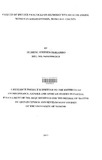| dc.description.abstract | This is a descriptive-cross-sectional study of effects of dry sex practices on the reproductive health among women in Asego Division, Homa-Bay County. In the study. various forms. benefits and adverse effects of dry sex practices were explored. The analysis for the study is based on a one and half month's fieldwork (July 2012-Aug 2012) where it involved a structured questionnaire survey involving thirty (30) women who had practiced dry sex. The research also conducted case narratives in the community on how dry sex practice is experienced. The study findings established the multidimensionality of dry sex practices and that women are still disadvantaged in spite of the reproductive and sexual health rights. The consumption of the dry sex practices is attributed to several factors; key among them is the cultural demand that women must service their male spouses' sex demands. This is compounded with a power relational dynamics that limits the woman to a spectator in sex matters. Detergents, salt solution and drying the vagina with cloth were some of the common forms of dry sex practices with an enhanced spousal and self sexual pleasure and alleviation of discomfort of wet vagina as some of the common benefits of dry sex practices. Dyspereunia, vaginal injuries and failure of penetration by a partner were among the adverse effects of dry sex practices. The study contends that the low educated women, those with high gravida as well as those engaged in Commercial Sex Work and those divorced/separated/widowed are the worst affected. In conclusion, the engagement in dry sex practices directly depends on the wider socioeconomic and institutional environment within and beyond the rural domain. An effective response to the practices therefore, requires a better understanding of what it means to be a woman in sexual matters thereby acknowledging a diversity of pathways out of the crude dry sex practices by for instance, taking into consideration the whole mindset of both men and women with regards to the practice. | en_US |

